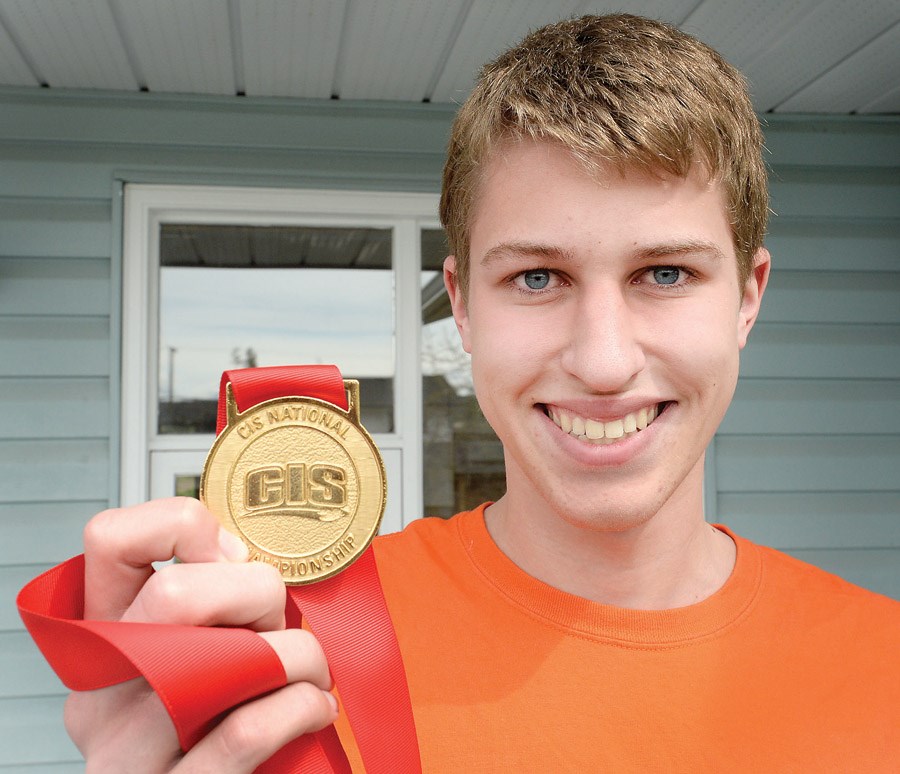Josiah Binnema has a long history as an early bloomer.
It started a few years after he joined the Prince George Barracudas Swim Club at age six. He advanced rapidly, leaving the other swimmers in his group in his wake, and established a pattern of accelerating to a faster group ahead of schedule.
In school, he surpassed his peers on the academic scale and skipped Grade 8, eventually graduating at age 16.
This school year, as a 17-year-old rookie on the University of Alberta swim team at the CIS championships in Victoria, the precocious Binnema helped the Golden Bears win the swimming program's first CIS gold medal since 1997 when they beat heavily-favoured UBC in the men's 4 X 100-metre medley relay.
Three weeks ago, Binnema bucked the odds again at the Canadian national team trials in Toronto, where he qualified for the world junior championships in Singapore this August with a scintillating time in the 100m butterfly.
Binnema will swim the 100 fly and the medley relay in Singapore, but could also compete in backstroke. He'll be there as part of the 19-member team for a week-long training camp to get used to the time change and the hot conditions.
Binnema is well aware of the rules of society in Singapore, where spitting and chewing gum are banned, there are harsh fines for littering and failing to flush toilets, and narcotics trafficking is punishable by death.
"We haven't gotten much information about the meet but they took us in for a meeting and told us Singapore laws are very strict," Binnema said.
"The people who win at the junior world meet are also under the FINA A cut all the time, which is the cut for the Olympics, so some of the people I'll be racing could be Olympians next year."
At the CIS relay, Binnema clocked a personal best 54.18 seconds with his butterfly leg - faster than the junior world standard, 54.86, but relay times do not count as qualifiers for individual races. He did meet the standard at the Canadian trials in the 100 fly preliminary race with a time of 54.82 but still hadn't locked up his spot on the team.
"I thought I made it and I was super-happy but the thing is you have to be the fastest in your age - the faster person in finals will get it and there was one other guy in finals who was under 18 and he just barely missed the cut on prelims," said Binnema.
"Then I found out that guy (was) actually scratched for the race because he already qualified for junior worlds in another race. So I knew I'd already made the team and was pretty relaxed for finals so I just needed to swim the 100 fly and hopefully do well."
He ended up with a time of 54.17, more than a second quicker than his previous best (55.46) going into the national meet.
Binnema, a psychology major at U of A, is the youngest member of the Golden Bears team. Many of his teammates started swimming before he was born. At the CIS championships, UBC was seeded four seconds ahead of U of A in the men's 400 medley relay. The Golden Bears won in 3:44.48, seven-hundredths of a second ahead of UBC.
"It was a huge upset," said Binnema. "UBC doesn't have a backstroker or a breaststroker, so we were quite far ahead by then, but in the butterfly leg I was getting chased down by Coleman Allen, who has the national record, but I managed to stay in front of him. Our freestyler was ahead by 1.7 seconds with 50 metres left and they almost caught up. It was very close."
Binnema wrote his last exam last week and took time out from his workouts to come back to Prince George to visit his family. He has started training with the Edmonton Keyano Club under coach Derrick Schoof.
"With Barracudas we did a lot of low-intensity work, and at U of A we switched to pretty much all high-intensity, which is nice for a sprinter like me, and at Keyano it's really amped up," he said. (Schoof) only coaches people who have made national teams and he keeps it at high intensity but he puts on way more metres, so you're swimming as fast as you can for as long as you can. I've been working on my freestyle pull a ton and that will really help with my fly."
Binnema got into swimming because he saw his older sister Kathryn having fun in the pool as a Barracuda. He said he almost quit when he was 10 because he was getting tired of training but his 'Cudas coach, Jerzy Partyka, helped change his mind.
"When we filled out the paper to say I was quitting, Jerzy said, 'Too bad, he would have been a good swimmer. Just come back and swim whenever you want,'" Binnema said. "So I ended up doing that and slowly got back into it.
"Three times a week was way too often then, now I'm training 10 times a week."
Partyka invited Binnema to speak to his youth national and elite swimmers this week and he's been taking part in Barracudas' workouts at the Aquatic Centre.
"He's a very talented kid and he's still growing, getting taller and stronger and more mature so he's swimming really good now," said Partyka. "To be at this level is no easy task and I'm sure he's able to be even better. He's very positive and happy about the possibilities he has.
"He's a very big part of that team in Edmonton. It's nice to have someone from a small community, a small club, be at the level he's doing now. It's very good for my younger swimmers."



